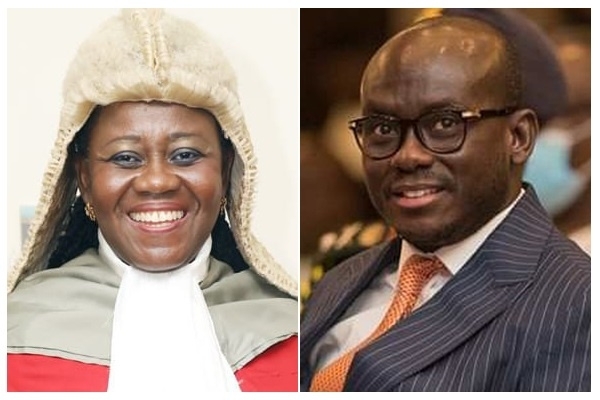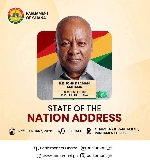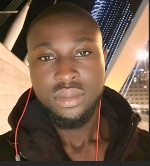'Sudden, dramatic, confusing, unreasonable' 11th-hr Opuni case panel change 'doesn't make sense, raises bias suspicion' – LINSOD says, 'It's not in best interest of justice'
 Justice Torkornoo and Godfred Dame
Justice Torkornoo and Godfred Dame
The 'sudden' change in the five-member Supreme Court panel hearing the controversial 'de-novo' appeal of former Ghana Cocoa Board CEO Dr Stephen Opuni in the GHS217 million financial loss case raises suspicions of judicial bias which is not in the best interest of justice, a group of lawyers calling themselves Lawyers In Search of Democracy (LINSOD) has said.
In a long statement signed by Mr Eric Delanyo Alifo, President; and Theophilus Dzimega Jr., Secretary, LINSOD said the attempt by Attorney General Godfred Yeboah Dame to defend the removal by the Chief Justice of three members of the original panel and replace them with herself and two others, was untenable.
In LINSOD's view, the eleventh-hour reconstitution of the panel in a case that has been bedevilled with so much suspicion of injustice since it started six years ago, bodes ill consequences for Ghana's justice system and democracy.
LINSOD described the Chief Justice's move as "dramatic, confusing, suspicious and unreasonable", which "doesn't make sense" and also "not in the best interest of justice".
Read LINSOD's full statement below:
LINSOD IS CONCERNED ABOUT THE SUPREME COURT'S CHANGE OF THE ORIGINAL PANEL IN OPUNI'S CASE: IT IS NOT IN THE INTEREST OF FAIR TRIAL AND ADMINISTRATION OF JUSTICE
1. We learned yesterday about the sudden alteration by the Chief Justice, of the original panel of Supreme Court Justices, which was constituted to hear the appeal brought by Dr. Stephen Opuni in his criminal trial currently at the High Court. We were not surprised by the public outrage that greeted the sudden change of the panel; however, our attention
was drawn later today to a public statement by the Attorney General and Minister of Justice seeking to defend the change of the original panel by the Chief Justice of the Republic, and we, as lawyers, seeking to promote the rule of law, democracy, and good governance in Ghana, feel compelled to add our voices to, and raise a germane concern about the sudden change in the composition of the panel, which we think is unreasonable, and not in the best interest of justice.
2. We hope that our concern shall be considered by the leadership of the judiciary as important feedback, which shall be helpful for the judiciary in charting a course that shall ensure greater justice for all Ghanaians irrespective of their ethnic or political affiliation. A good-faith attention to our concerns shall also demonstrate responsiveness of the judiciary to the cries of the general public, and shall instill, not only decency, but greater confidence in our justice system, and boost the democratic credentials for our nation as a whole. Our recall of the events and circumstances of this matter are as follows:
i. The appeal before the Supreme Court resulted from the decision by the Court of Appeal to overturn a new trial judge’s decision to hear the case de novo (to start anew or afresh ) in line with the common practice in our jurisprudence and all over the world in criminal trials after the new judge had taken over the case from the retired Supreme Court Justice Clemence Honyenuga. It is noteworthy that this case, at trial with the original trial judge, was very controversial, and characterised by numerous interlocutory appeals, and sometimes with very strange decisions.
ii. In these circumstances, any new judge, and all such legal experts, who are mindful of administering fair justice shall welcome a trial de novo, which the new trial judge, Justice Kwasi Anokye Gyimah had rightly decided to conduct in April 2023. Unfortunately, however, the decision of the trial judge did not sit well with the Attorney General, so he appealed the decision to the Court of Appeal, and he surprisingly secured a favourable decision within a few months on July 3rd, 2023.
iii. Following the decision of the Court of Appeal, the lawyers for Dr. Opuni filed an interlocutory appeal (for interim decision on that issue alone) to the Supreme Court on July 7th, 2023, and while the case continued in accordance with the decision of the Court of Appeals for months, the Supreme Court only allowed the first hearing of the appeal on January 17th, 2024. In that hearing, the five-member panel of Supreme Court Justices was led by Justice Mariama Owusu, and included Justices Yaw Darko Asare, Emmanuel Yonny Kulendi, George Kingsley Koomson, and Henry Kwofie. This was the panel everyone knew to be responsible for the appeal, and reasonably expected to hear the entire appeal to the end and deliver judgment of it.
iv. Amazingly, after the known panel had taken the parties through what lawyers term as “case management,” and ordered the parties to file their final submissions and report in court for a date for judgment, the parties went to the Court yesterday, May 13th, 2023 only to find a new panel of Justices presided over by the Chief Justice, and comprising of only two members of the original panel, and without any explanation of why the dramatic change was necessary in such a crucial and controversial case being prosecuted by the regime.
3. We have noticed the change of the panel with grave concern. We have also noticed the public outrage to the change of the panel, which was reasonably and lawfully expected to continue with the hearing of the appeal, and deliver its judgment of same. We have listened attentively to the legal arguments made by Counsel for the appellant in reaction to the change, and we have carefully examined our practice procedures and the relevant constitutional provisions, particularly, article 157(3) which provides that: Without prejudice to clause (2) of this article, no person sitting in a Superior Court for the determination of any cause or matter shall, having heard the arguments of the parties to that cause or matter and before judgment is delivered, withdraw as a member of the court or tribunal, or as a member of panel determining that cause or matter, nor shall that person become functus officio in respect of that cause or matter, until judgment is delivered.
4. By this constitutional provision, even if anyone would want to disingenuously venture a suggestion as done by the Attorney General, Mr. Godfred Dame that the arguments in the appeal in question had not yet been heard by the original panel, it is nevertheless unreasonable at this stage, and it provides a firm basis for suspicion of bias by the Court against the appellant to alter the panel that managed the case thus far, and without any plausible explanation.
5. It really does not make much sense, legal, or otherwise, for the Court to change, at this very last stage, the panel that had shepherded the appeal, and was more familiar with all the processes than all the other Justices of the Court. This confusing attitude of the Court may be seen as amounting to nothing less than an obvious interference in the administration of justice and a lack of fair trial of the appellant in its true sense.
6. We have carefully studied the statement that was issued by the Attorney General on this subject, and strikingly missing is the statement is any argument to justify the reasonableness of the decision of the Chief Justice to change the panel hearing a controversial case at the eleventh hour of the case. The Attorney General claims to be educating the general public by referring to the Courts Act, 1993 (Act 459) to explain that no individual has the right to determine the court or a panel of court that must hear his or her matter, and it is the sole preserve of the Chief Justice to determine these matters. He also referred to article 128 (3) of the 1992 Constitution to explain that the Chief Justice is a member of all the courts in Ghana, and whenever she would sit with a panel, she shall preside.
7. All of us, lawyers, know the above, but we also know the limitations on the Chief Justice, such as in article 157(3) of the 1992 Constitution. We know also that in performing her duties, the Chief Justice is duty-bound to be reasonable and not arbitrary. The Attorney General must be mindful that what is fair, good, and right in a democracy is for those clothed with certain powers over the citizenry to exercise such powers in a fair and reasonable manner to all citizens equally. This is not what most Ghanaians are currently experiencing under the current regime, and it is of serious concern for many of us who are interested in good governance and better administration of justice and rule of law.
8. Having considered all the issues that are germane to this case, and their implication for the perception of fairness and justice in the prosecution of the case in question, it is of major concern to us that the Supreme Court would change the original panel at this eleventh hour, and open further avenues for many citizens to question the fairness of our judiciary to all Ghanaians irrespective of their ethnic or political background.
9. It is important to state additionally that we have also followed the history of the prosecution of the appellant, Dr. Stephen Opuni, and we find the history of the case rugged, chequered, and very eventful. It is more so, having regard to the particular fact that such a public interest matter in the appeal is before the Apex Court of the land (Supreme Court), and the Court would change the original panel hearing the matter and create uproar and further controversy surrounding the case.
10. In our jurisprudence, and from what we know all around world, it is trite that nothing is better than a trial de novo in a controversial criminal trial with several interlocutory appeals, when the judge in the center of it all is no longer at post and in the case for that matter, this was affirmed by the Supreme Court ruling in the Republic v, Adu-Boahene (1992- 93) 2GBR 452 where the court stated that a trial can only be ordered de novo if the trial is aborted or a fresh hearing is ordered. Sadly, this well-tested principle was what the Attorney General sought to overthrow, and he succeeded in so doing just in pursuit of a political opponent. The history of this case makes it the most controversial case for the regime in power, and it, therefore, attracts tremendous attention, with all lawyers and well-meaning Ghanaians who are mindful of true justice having their eyes on how the appeal before the Supreme Court shall be determined.
11.In light of the extreme interest of the general public in this matter, it is important for the courts to be more circumspect in order to ensure that our citizens shall trust the justice system after the end of this case.
Accordingly, the courts must not easily shake-off time tested principles, especially if doing so shall inure to the benefit of the state (government) against an innocent private citizen, who belongs to an opposition political party. We think that justice delivery should be seen to be independent of any political party in power or the position occupied by any individual, or by way of opportunity or privilege.
12.While the Court in all sincerity may not be pursuing a course in the interest of the regime in power, it is imperative to ensure that the general public does not have a different perception as a result of the conduct and decisions of the courts especially in political matters that are brought by the government against citizens of different political affiliations than the party in power. Unfortunately, it appears this is the situation presently, and our efforts through this statement and more is to turn the tides and neutralise this dangerous perception.
13.We think there is plenty of time for the Supreme Court to reconsider the decision to change the original panel in the appeal. We are aware that the Court has already given a date for judgment, but we believe that if it shall bring fairness and greater justice to all without question, the Court must nevertheless recall the case and reinstate the original panel to continue the trial to end. It is our hope that the Court shall respectfully give the due attention to our concern and act in a manner that shall encourage us to provide more feedback to it in the advancement of true rule of law and democracy in Ghana.
Long live LINSOD
Long live Democracy
Long live Ghana.
Signed:
ERIC DELANYO ALIFO, ESQ.
PRESIDENT, LAWYERS IN SEARCH OF DEMOCRACY
THEOPHILUS DZIMEGA JR ESQ
SECRETARY, LAWYERS IN SEARCH OF DEMOCRACY
Source: classfmonline.com
Trending News

Lack of equipment and strict payment protocols hindering emergency laboratory care – GAMLS
17:34
NDC confident of defeating NPP in all free and fair elections
07:07
Energy Minister announce measures to end metre shortages
15:01
Technical team conducts nationwide hospital needs assessments amid strategic talks in Accra
16:09
Interior Minister donates food items to prisons to support inmates during Ramadan
07:37
CDM accuses gov’t of violating constitutional duty on basic education
06:47
Ablekuma West MP defends decongestion exercise, urges lawful conduct
12:25
Parliament of Ghana announces details for 2026 State of the Nation Address
17:13
Oyarifa murder:Father demands justice from Mahama, IGP
06:29
‘When Parliament stands, democracy stands’ — Minority defends Constitutional order
11:48




